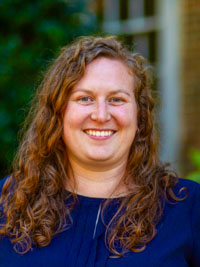2025 Impact Awards
For graduate student research that benefits North Carolina
Each year, The Graduate School honors graduate students in programs throughout our University for their powerful discoveries that contribute to a better future for people and communities in North Carolina. We’re pleased to present 13 Impact Awards for 2025 — and to share the honorees’ own descriptions of their research projects.

Understanding the health impacts of wildfire smoke on vulnerable communities
Aleah Bailey, doctoral student in toxicology
“Wildfires are becoming a bigger public health issue due to worsening climate conditions like extreme heat, high winds and drought. They are increasingly common across the country, including in North Carolina. The smoke from these fires contains tiny particles that can cause inflammation in the lungs and body. Disadvantaged communities suffer more severe health problems after wildfires, but traditional risk assessments often overlook their stress-related vulnerabilities.
My research looks at how stress affects people's health after exposure to wildfire smoke. My analysis showed that stress altered inflammatory responses to woodsmoke. This means people with high stress and recent smoke exposure may have worse health outcomes
By including stress in risk assessments and studying disadvantaged communities, we can create better strategies to improve health outcomes related to pollution.”

Considering North Carolina farmworkers' experiences through storytelling
Sarah Blanton, doctoral student in romance studies
“Across North Carolina, laborers work in the sweltering summer heat, harvesting crops that communities rely on. By late autumn, many of these workers board buses back to Mexico until the next peak agricultural season approaches. As of January 2022, an estimated 2.9 million migrant farmworkers work in the US, most of whom come from Mexico. North Carolina hosts between 14,000 and 17,000 seasonal farmworkers each year. Despite their crucial role in food production, their lives and contributions are often overlooked.
My dissertation explores the experiences of farmworkers through various forms of storytelling, considering things such as songs, short stories, cleanly plowed fields, and marigold flowers in rural North Carolina as narratives. I combine these with ethnographic descriptions, archival materials and literature to highlight this essential community and consider their experiences.
My project focuses on what transnational labor looks like locally through active community participation. I hope my research encourages dialogue on how local communities with deep agricultural roots can become more integrated, inclusive, and appreciative of these laborers.”

Preventing maternal morbidity through prenatal care
Laura Chaves Cerdas, doctoral student in public policy
“My research aims to find out whether pregnant women in North Carolina who have diabetes or high blood pressure can prevent serious health problems during birth by going to the recommended number of prenatal visits.
Going to prenatal care visits helps detect problems early in pregnancy and prevent serious health problems during birth. It can also encourage healthy habits that benefit them for life. In 2021, 1.21% of pregnant women in North Carolina had diabetes and 3.39% had high blood pressure. Properly managing these conditions during pregnancy through prenatal care can improve health outcomes for both mothers and babies.
I discovered that for North Carolinians from 2011 to 2019, not going to enough prenatal care visits increased the chances of serious health problems during birth. This effect was even stronger for people with diabetes or high blood pressure. I hope my research highlights the importance of attending prenatal care visits for pregnant women in North Carolina.”

Improving transportation systems for NC patients experiencing mental health crises
Jeremy Fine, MD-PhD student in health policy and management
“In North Carolina, members of our community experiencing mental health emergencies are often transported by law enforcement. This can be traumatic and make them feel like criminals, which might prevent them from seeking help in the future. The Non-Law Enforcement Transportation (NLET) Program is a new $20 million state project that aims to provide a more compassionate, patient-friendly way to transport these individuals.
To see how well this program works, I led a team to create a detailed plan. We will use surveys and interviews with patients and their families, and get feedback from healthcare workers, police and transportation providers. We'll also analyze data about how services are used and paid for. This will help us see if the program makes patients' experiences better, reduces forced hospitalizations, lowers costs, and ensures everyone has fair access to the service.
Once this plan is executed, the findings will help North Carolina officials decide whether the NLET Program should be expanded statewide. It will also guide other states considering similar programs. By promoting a more compassionate approach to crisis care, my work aims to improve mental health systems and reduce the trauma people experience during psychiatric emergencies.”

Ecological practices to promote NC oyster populations
Nicholas Funnell, doctoral student in ecology
“Since 2003, North Carolina has established nearly 3,000 acres of oyster farms and protected areas as part of its goal to become “The Napa Valley of Oysters.” While this focus on oysters is promising, the reality is that oyster farms in NC have experienced severe die-offs, often losing over 90% of their oysters. Wild reefs have also suffered, losing nearly half their adult oysters in two years, showing that this problem isn't limited to farms.
Oysters are very important for the health of the ecosystem, and their loss affects NC communities in ways beyond just having fewer oysters to sell. In my research, I studied oyster-related practices in NC and suggested some changes to help improve oyster health.
First, I discovered that moving young oysters from saltier to fresher waters can help them grow and survive by reducing the number of predators. Second, I learned that harvesting only large adult oysters from reefs appears to be sustainable. Third, the location and equipment used in oyster farms can help reduce water pollution, but this needs to be analyzed for each specific site and isn't a one-size-fits-all solution. While these small changes can't fix major water quality issues, they can still help oyster populations and the people who depend on them.”

Improving flood hazard models for hurricane risk assessment
Lauren Grimley, doctoral student in earth marine, and environmental sciences
“Hurricanes are a major concern for North Carolina because they cause widespread flooding, which damages homes, public infrastructure, and the economy. Hurricane flooding is complicated because it can be caused by many factors like sea level, storm surge, waves, wind, rainfall and streamflow. However, traditional flood models usually consider only one factor and are not very detailed. This is an issue because these models are needed to understand risk, set building standards, prevent development in risky areas, and set flood insurance requirements. To make good decisions and reduce future damage, communities need accurate and detailed flood risk assessments.
In my dissertation, I use a flood model that takes into account multiple factors to provide better flood hazard information for hurricanes impacting eastern North and South Carolina. I use this model to study how climate change, such as more rainfall and stronger storms, could worsen flooding from storms to determine who and what may be exposed.
My results show that heavy rainfall from hurricanes in the future will not only generate more flooding inland but will worsen flooding at the coast which is also exposed to storm surge. These extreme storms will generate flooding over larger areas, producing greater flood depths that impact infrastructure and people. For example, I found that if Hurricane Florence (2018) happened in a warmer climate, the number of affected buildings and roads would double. The flood data created as a part of my dissertation is being used by state-level organizations responsible for infrastructure design, flood recovery, and adaptation planning, like the NC Office of Recovery and Resilience (NCORR) and NC Department of Transportation (NCDOT).”

Building psychological resilience among active-duty military service members
Kenneth Harris, III, doctoral student in social work
“North Carolina is home to many active-duty military members, ranking fourth in the US. It houses over 8.5% of the nation's active military force, which includes nearly 100,000 service members and over 112,000 family members.
Many service members join the military to find better opportunities and resources, especially those from difficult backgrounds. Sadly, studies show that 1 in 4 service members suffer from mental health problems like depression and suicidal thoughts. These challenges are often exacerbated by the demands of military life. Minority service members face even more difficulties with mental health and getting treatment, which means they need new ways to get help.
Psychological resilience is a strengths-based approach to mental health that focuses on dignity and self-worth. My dissertation aims to find new ways to build psychological resilience among minority service members and their families. For this research, I am using data from a 2021 military unit wellness survey completed at Fort Bragg, NC to help create strategies for building resilience.”

Addressing burnout among North Carolina healthcare professionals
Elizabeth Kwong, doctoral student in biomedical and health informatics
“My research addresses healthcare professionals’ burnout and well-being in North Carolina. Burnout is very common among healthcare workers and negatively affects their well-being, leading to a higher risk of medical errors and patient harm.
We used a systems analysis approach to measure burnout, identify its causes, and find ways to improve the situation based on feedback from healthcare teams. We provided detailed reports and practical recommendations to leaders in over six different medical departments at UNC Health, including emergency medicine, plastic surgery and trauma surgery.
Our work outlines easy-to-implement methods to identify burnout and suggests improvements that can be applied in other healthcare settings. This research directly benefits healthcare professionals in North Carolina by giving health system leaders high-impact, low-effort recommendations.
Results showed that burnout rates among healthcare professionals ranged from 56% to 88%, with causes varying by department. Common issues included inefficient workflows, excessive workload, the severity of patients' conditions, and work-life balance. We provided customized recommendations to each department to address their specific needs, such as improving patient workflows, protecting time for breaks, and aligning job responsibilities. These recommendations are now being implemented by department leaders with support from the Division of Healthcare Engineering. Our approach is also being used to address burnout and well-being in other departments across UNC Health.”

Impact of multiple factors on the financial and mental well-being of NC breast cancer survivors
Olufeyisayo Odebunmi, doctoral student in health policy and management
“Even though breast cancer survival rates have improved across the country, racial inequalities still exist. In North Carolina, White women are more likely to get breast cancer, but Black women are more likely to die from it. Dealing with breast cancer can cause stress and financial problems, and Black women in NC are affected more than others.
My research looks at how different factors affect the financial and mental health of Black and White breast cancer survivors. The first part of my study examines how individual and area-level factors impact mental health and financial difficulties. The second part involves interviewing Black breast cancer survivors in NC to understand what affects their emotional well-being.
By finding out how these factors influence mental and financial outcomes, my research aims to provide important evidence to help make systemic changes. This could reduce barriers and improve mental health and fairness for breast cancer survivors.”

Improving transportation for Medicaid beneficiaries in North Carolina
Annie Oommen, master’s student in city and regional planning
“In July 2021, most Medicaid beneficiaries in North Carolina switched from a fee-for-service model to Managed Care. This change divided responsibility for coordinating non-emergency medical transportation, a free service for all beneficiaries, among several different groups.
My research highlights the ways that Medicaid beneficiaries in North Carolina are struggling to access healthcare under the new system. Policymakers need to use these findings to fix the unintended problems caused by the Medicaid Transformation to ensure that vulnerable populations have the same mobility as everyone else.
For those who can't drive due to physical ability, legal status or cost, these transportation services are their link to all types of non-emergency care, from regular chemotherapy to treatment for acute conditions like shingles. The quality and reliability of non-emergency medical transportation services can mean the difference between life and death. Given the demographics of Medicaid, this work directly impacts low-income, elderly, disabled and rural North Carolinians from the mountains to the coast.”

Improving health outcomes through collaborative public health leadership
Courtney Peragallo, recent master’s graduate in public health
“Recent research shows how the COVID-19 pandemic affected the most vulnerable communities in the United States, revealing health inequities while providing a roadmap for improving health in marginalized communities. North Carolina's COVID-19 response, led by Mandy Cohen, is seen as a nationwide model for community engagement and crisis response.
Statewide partnerships and strengthened public health preparedness led to significant results for marginalized populations. These include reducing racial disparities in COVID-19 death rates, increasing access to testing and treatment for Black/African American and Hispanic communities, and improving professional training for students at public universities like UNC-Chapel Hill and 12 Historically Black Colleges and Universities.
Our research looks at how collaborative public health leadership improved COVID-19 outcomes and prepared future leaders to handle crises. The impact of partnerships across different fields reduced racial disparities and promoted health equity for those who faced barriers in accessing COVID-19 testing, treatment, and vaccines.
Building a diverse network of partners from state government, academia, healthcare and marginalized communities helps advance health equity. By bringing together all these partners, we can reduce disparities in vaccine and testing access, improve public health leadership skills, and enhance state-level public health preparedness.”


Health impacts of environmental hazards on migrant farmworkers
Sarah Perry and Charlotte Robbins, recent master’s graduates in public health
“Farmwork is one of the most essential and dangerous jobs in the United States. North Carolina, a top agriculture-producing state, hosts up to 70,000 migrant farmworkers and their families annually. These workers face unique stressors such as environmental hazards like pesticides and heat, poor access to healthcare, and discrimination.
We partnered with NC FIELD, a farmworker advocacy organization in eastern North Carolina, to collect stories from farmworkers about how these challenges affect their health and lives.
We also looked at how policies on migration, housing, and labor impact their health and access to services. Our goal is to improve policies to protect farmworkers.
This fall, we supported OSHA’s proposed rule on heat protection for farmworkers and suggested ways to strengthen it. Our work has helped maintain UNC’s partnership with NC FIELD and created new opportunities for collaboration.
We are thankful for NC FIELD's guidance. Together, we aim to share our findings with farmworkers and advocate for their health and well-being.”

Impact of representation in children’s literature on North Carolina kindergarteners
Jennifer Stone, recent doctoral graduate in speech and hearing sciences
“Since 2017, North Carolina has invested over $25 million in Dolly Parton’s Imagination Library to distribute picture books to nearly half of the state's young children. The goal is to improve family literacy and economic development, based on research linking book ownership to better academic outcomes and a more educated workforce. However, the content of these books can shape children's views of themselves and society, and many award-winning books contain stereotypes that reinforce cultural biases. Policymakers might not have considered the impact of all kindergarteners owning the same set of 60 books.
My analysis of the 60 books given to kindergarteners in 2022 showed improved racial diversity compared to other collections. However, there were no representations of people with disabilities or those who identify as LGBTQ+. This means children and families in North Carolina with these identities did not see themselves in the Imagination Library.
Additionally, the collection included negative clichés about reading and stereotypes that favor White, middle-class, heterosexual, and able-bodied norms, often placing the responsibility on mothers to shape their children to fit social expectations. This could lead to negative biases about literacy and culture in families and classrooms. Accurate representation is essential for our society.”
